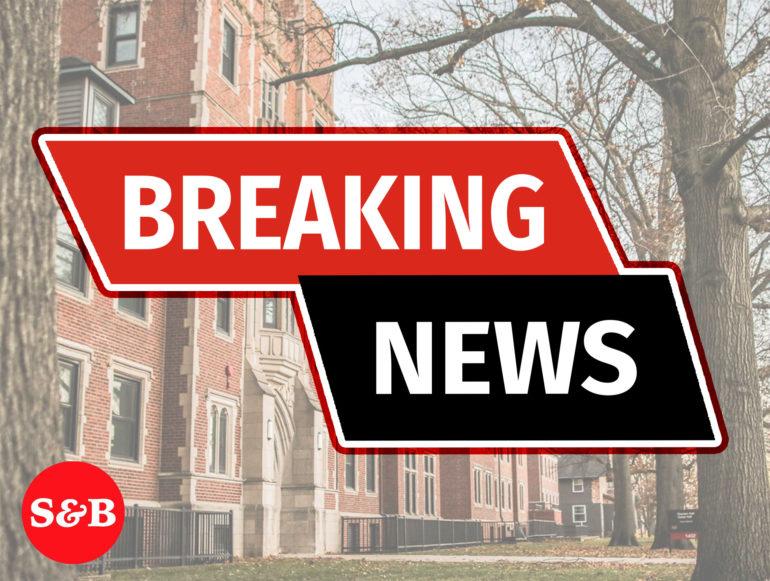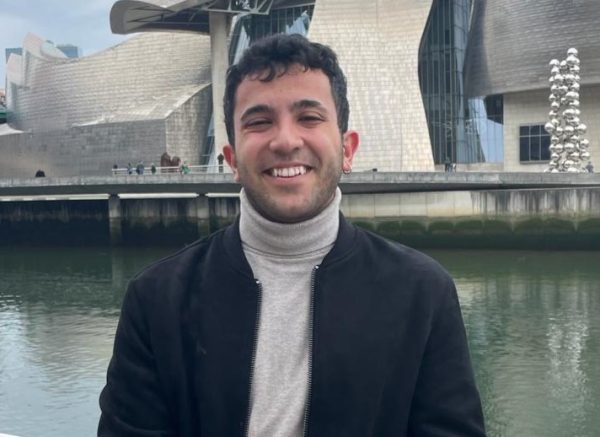“This is exhausting, I just want it to be over,” first-year student speaks about misinformation circulating on social media
November 14, 2022
A screenshotted Google document circulating on Instagram that describes an alleged attack on a “Southeast Asian American first-year student” on campus has sparked controversy, concern and confusion within the Grinnell College community.
On Oct. 11, Shabab Kabir `26 was the victim of two separate incidents on and off the Grinnell College campus, which left him injured and needing to seek medical care. The details of these incidents were then subject to campus-wide speculation after a Google document created by Hannah Biles `23.5 and Attaira Prince `23 began circulating on social media weeks after the incidents occurred.
The sharing of this document and a subsequent GoFundMe set up on behalf of an “anonymous first-year” have led to some members of the College community claiming the Google document has bred misinformation.
“There are inaccuracies in this statement [circulated Google document] that are important to address because the circulation of misinformation has caused fear among members of our community,” said an email titled “Statement About Social Media Posts” that was sent out by the Grinnell College Office of Communications on Nov. 9.
“I never wanted it to be public. I didn’t find out about the document until I was on Instagram, and I didn’t know when it was made and how it spread so far … I’m not even Southeast Asian,” said Kabir, who identifies as Bengali and South Asian.
Kabir explained that he had initially only disclosed the details of the incident with his friend, Prince.
“I was shocked,” she said. “To hear that someone is actually targeted on campus is surprising,” added Prince. With Kabir’s permission, Prince shared her recollection of the details of the incident with her friend, Biles.
“I was like, ‘how do people not know about this?’ It’s like physical violence that no one knows about,” said Biles, who decided with Prince to create the Google document describing the incident. “The document was definitely a rough draft,” said Prince. “It was written without referral back to him [Kabir].”
“It was a third-person account of events. There are a lot of things that needed to be clarified in that Google [document], it was never meant to go out,” said Biles who, out of concern and “kind of on a whim,” shared the document with her sociology class.
“I think that that was a complete lack of forethought on my part, I didn’t think of the consequences,” said Biles. “From there, I saw that someone had shared it with an MLC [Multicultural Leadership Council] group, then the MLC group shared it with everyone.”
After the document was shared, the International Student Organization sent an email titled “Racist Hate Crimes at Grinnell” on Nov. 3 with the attached Google document. Another email with the same subject line was sent by the Chinese Student Association on the same day with the attached document and read: “Our hope is to have everyone aware and protect themselves to the best extent. Please spread this message to your friends and classmates!”
“Social media went on a frenzy about it,” said Kabir. He also noted a number of inaccuracies in both the College’s Nov. 9 statement and in the document circulating on social media.
According to Kabir, he was walking between Younker Hall and Joe Rosenfield Center with his uncharged electric scooter heading back to his dorm after a meeting around 8 p.m. Then, “out of nowhere, someone with their bicycle collided with me and then they just kept going, and then I fell really hard and came unconscious for several minutes,” he said.
Kabir described the person who ran into him as “a white slender person with a duck grey hat,” he said. “That’s all I know, but it was also really dark, whether or not they actually were white or not, I don’t know.”
The duck grey hat was mentioned in the Google document and was a source of confusion to many students online. Kabir clarified that it refers to a grey baseball cap with an embellishment of a duck on it.
After regaining consciousness, Kabir tried to call Campus Safety repeatedly. “For some reason, they weren’t picking up and I don’t know if that’s my phone’s fault, or if it was like their own phone system,” he said, contrary to what was shared on the Google document. It stated that, “the student called campo [Campus Safety] and campo said, ‘we’re too busy rn [right now].’”
James Shropshire, director of Campus Safety, referred the S&B to the Office of Communications and Marketing for comment. Ellen de Graffenreid, vice president of communications and marketing, declined comment beyond what was already shared in the Nov. 9 all-campus email.
Unsuccessful in reaching Campus Safety, Kabir then decided to drive himself to the Grinnell Regional Medical Center emergency room. “I was bleeding a lot [from] my head,” he said.
Driving westbound along 10th Avenue, he noticed a white SUV behind him that he said he thought was following him. “I purposely took a lap around the neighborhood just as a check and then they were still following me,” he said.
Kabir said he then continued to the hospital and, “as I was turning into the neighborhood, they hit me in the back.” He said the white SUV hit his own car from behind. “Hit and run, the dude was gone, he just vroomed away. I was frozen for several minutes,” he said.
Kabir said he couldn’t be sure whether the driver of the vehicle was the same man with the bike who had run into him earlier in the evening. “It was the same vehicle and it looked like the same person with the bike, although whether or not it actually was [the same person] is a different question, but it looked like them. They had the cap, it looked like the same cap, but then again it was really dark,” said Kabir.
Concerned for his safety, Kabir decided to return to his room and call Campus Safety to drive him to Grinnell Regional Medical Center’s emergency room instead. “This time they actually picked up,” Kabir said. He said that the Campus Safety officers then offered him first-aid help before transporting him to the hospital.
Kabir described discovering that his wounds were beyond injuries on his face and hands when he laid back on the hospital bed. “It had like this white paper on, and I started seeing red streaks of blood on it which meant that I was bleeding from my back.”
“The hospital thought that there was some kind of jagged object that was cleanly and deeply cut into me and that it wasn’t consistent with my accident [in the car].” Kabir referred to his back laceration as a “stab wound.”
Following the events of Oct. 11, the incident was not reported to the College or the Grinnell Police Department (GPD) until Oct. 28, when Kabir shared the incident with Kate Ferraro of Academic Advising, who then filed a Bias Incident Response Team (BIRT) report on his behalf to the College. The GPD never received a report about the incident according to Shannon Watts, a GPD administrative clerk.
“The College’s response teams are only able to move forward with action on an incident if the impacted student or a witness — or a College official like an academic advisor or a staff member — makes a report. When incidents are not reported for several weeks, it is difficult for the police to find the individuals responsible and hold them accountable,” said the Nov. 9 all-campus email sent out by the College.
In an email to the S&B, de Graffenreid wrote, “I can affirm that Campus Safety responded to the student’s call and ensured that they received care. No BIRT report was filed at that time.”
To address why he didn’t file a BIRT report, Kabir said he didn’t know how to and assumed Campus Safety would do so on his behalf. “They said they would contact me with next steps, but they never did,” he said.
“They [Campus Safety] looked like they were taking notes, but I guess they didn’t end up reporting that,” Kabir said.
Kabir said that he received a multi-thousand-dollar bill following his visit to the emergency room and that he decided to pay it off by putting as much of the bill as possible on his credit card. He then applied for College emergency funds, which are capped at only $1,000 and require the requestor to obtain itemized receipts. After hearing about what happened, one of Kabir’s friends from home in Oklahoma, Erik Martin, made a GoFundMe to support his medical expenses.
“That GoFundMe was supposed to be for people in my hometown, not for, you know, Grinnell people,” said Kabir.
“I never shared it, I never asked people to donate to it,” said Kabir. “I didn’t want this to explode at all because I have that feeling that history repeats itself. Anytime some kind of weird crime explodes, it always ends up backfiring for the victim. I just wanted to keep it down low. Especially with Grinnellians, it can go on fire very fast.”
Kabir added that he initially didn’t think the incident was racially motivated. This was not reflected in the Google document shared by Biles which referred to the incident as “racist violence.”
“The student did not state that they were the victim of a race-related incident,” said the email sent by the College which referred to the initial notes written by Campus Safety the day of the incident.
“When the student later called for a return transport, they reported a small cut on their side and stated that they must have fallen on something,” read the email sent by the College. “Grinnell called my stab wound a ‘small cut,’ it felt very dismissive,” said Kabir in response to the College’s email.
“Ever since the [College’s] email went out, I noticed social media went crazy again, and this time it looked like it was antagonizing against me this time,” said Kabir. “I remember one Yik Yak saying ‘lmao admin told us the truth, student just scammed all of us.’”
He added that his name mistakenly appeared on the GoFundMe as the beneficiary for a few minutes and that multiple students were then able to identify and reach out to him through email.
“I guess some students recognized who I was. I don’t know if it was the band-aid, I don’t know if it’s my ethnicity or whatever, but some people physically came up to me and said I just scammed them and they wanted their money back,” he said. “I sent their names to my friend [Martin] and asked him to return their money. I think it is now around $900 and will end up being around $500 after the money is returned,” he said, referring to the GoFundMe.
“Hearing everything that was happening on campus in response to that information, and that people were basically talking trash about it, it kinda got overwhelming,” said Prince.
Following the negative response, Prince and Biles decided to remove public access to the Google document.
“This is exhausting. I just want it to be over,” said Kabir.


















































